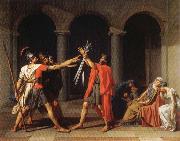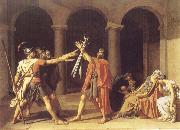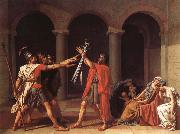Wholesale Oil Painting No Minimum |
|||||||||||
|
|
|||||||||||

|
|||||||||||
|
|
|
||||||||
Jacques-Louis DavidJacques-Louis David, France Neoclassicism painter, b.1748 - d.1835. Jacques-Louis David is famous for his huge, dramatic canvasses of Napoleon and other historical figures, including Oath of the Horatii (1784), Death of Marat (1793) and The Sabine Women (1799). Early in his career he was a leader in the neoclassical movement; later his subjects became more modern and political. David was himself active in the French Revolution as a supporter of Robespierre and is sometimes called the chief propagandist for the Revolution; after the Reign of Terror ended he was briefly imprisoned for his actions. When Napoleon took power David became his court painter and created several grand canvasses of the Emperor, including the heroic Napoleon Bonaparte Crossing the Alps (1801) and the enormous Coronation of Napoleon and Josephine (1807). |
||||||||
|
|
||||||||
THe Oath of the Horatii
THe Oath of the Horatii Painting ID:: 30642 |
mk68
Oil on canvas
Paris,Louvre
c.1784
France
mk68 Oil on canvas Paris,Louvre c.1784 France |
|||||||
|
|
||||||||
Jacques-Louis DavidJacques-Louis David, France Neoclassicism painter, b.1748 - d.1835. Jacques-Louis David is famous for his huge, dramatic canvasses of Napoleon and other historical figures, including Oath of the Horatii (1784), Death of Marat (1793) and The Sabine Women (1799). Early in his career he was a leader in the neoclassical movement; later his subjects became more modern and political. David was himself active in the French Revolution as a supporter of Robespierre and is sometimes called the chief propagandist for the Revolution; after the Reign of Terror ended he was briefly imprisoned for his actions. When Napoleon took power David became his court painter and created several grand canvasses of the Emperor, including the heroic Napoleon Bonaparte Crossing the Alps (1801) and the enormous Coronation of Napoleon and Josephine (1807). |
||||||||
|
|
||||||||
|
|
The Oath of The Horatii
The Oath of The Horatii Painting ID:: 39487 |
mk149
1784
mk149 1784 |
||||||
|
|
||||||||
Jacques-Louis DavidJacques-Louis David, France Neoclassicism painter, b.1748 - d.1835. Jacques-Louis David is famous for his huge, dramatic canvasses of Napoleon and other historical figures, including Oath of the Horatii (1784), Death of Marat (1793) and The Sabine Women (1799). Early in his career he was a leader in the neoclassical movement; later his subjects became more modern and political. David was himself active in the French Revolution as a supporter of Robespierre and is sometimes called the chief propagandist for the Revolution; after the Reign of Terror ended he was briefly imprisoned for his actions. When Napoleon took power David became his court painter and created several grand canvasses of the Emperor, including the heroic Napoleon Bonaparte Crossing the Alps (1801) and the enormous Coronation of Napoleon and Josephine (1807). |
||||||||
|
|
||||||||
|
|
The oath of the Horatii
The oath of the Horatii Painting ID:: 42737 |
MK169
1784-85 oil Paint on cloth ca.427x335cm MK169 1784-85 oil Paint on cloth ca.427x335cm |
||||||
|
|
||||||||
Jacques-Louis DavidFrench b.Aug. 30, 1748, Paris d.Dec. 29, 1825, Brussels Jacques-Louis David is famous for his huge, dramatic canvasses of Napoleon and other historical figures, including Oath of the Horatii (1784), Death of Marat (1793) and The Sabine Women (1799). Early in his career he was a leader in the neoclassical movement; later his subjects became more modern and political. David was himself active in the French Revolution as a supporter of Robespierre and is sometimes called the chief propagandist for the Revolution; after the Reign of Terror ended he was briefly imprisoned for his actions. When Napoleon took power David became his court painter and created several grand canvasses of the Emperor, including the heroic Napoleon Bonaparte Crossing the Alps (1801) and the enormous Coronation of Napoleon and Josephine (1807). David also painted Napoleon in His Study (1812), with its famous image of Napoleon with one hand tucked inside his vest. After Napoleon ouster David went in exile to Brussels, where he remained until his 1825 death |
||||||||
|
|
||||||||
|
|
The Oath of the Horatii
The Oath of the Horatii Painting ID:: 62874 |
1784 Oil on canvas Musee du Louvre, Paris The Oath of the Horatii proved to be a triumph for David. The public was overwhelmed by his break with the Baroque stylistic tradition. For the first time, the unity of time and action had been brought into a deliberately severe composition. The story of the passionate readiness of these heroes for self-sacrifice was known, and it was also recognized that the weeping women in the composition are an expression of foreboding, symbols of the tragedy to come. Artist: DAVID, Jacques-Louis Title: The Oath of the Horatii (detail) , painting Date: 1801-1850 French : historical 1784 Oil on canvas Musee du Louvre, Paris The Oath of the Horatii proved to be a triumph for David. The public was overwhelmed by his break with the Baroque stylistic tradition. For the first time, the unity of time and action had been brought into a deliberately severe composition. The story of the passionate readiness of these heroes for self-sacrifice was known, and it was also recognized that the weeping women in the composition are an expression of foreboding, symbols of the tragedy to come. Artist: DAVID, Jacques-Louis Title: The Oath of the Horatii (detail) , painting Date: 1801-1850 French : historical |
||||||
|
|
||||||||
|
Jacques-Louis David French b.Aug. 30, 1748, Paris d.Dec. 29, 1825, Brussels Jacques-Louis David is famous for his huge, dramatic canvasses of Napoleon and other historical figures, including Oath of the Horatii (1784), Death of Marat (1793) and The Sabine Women (1799). Early in his career he was a leader in the neoclassical movement; later his subjects became more modern and political. David was himself active in the French Revolution as a supporter of Robespierre and is sometimes called the chief propagandist for the Revolution; after the Reign of Terror ended he was briefly imprisoned for his actions. When Napoleon took power David became his court painter and created several grand canvasses of the Emperor, including the heroic Napoleon Bonaparte Crossing the Alps (1801) and the enormous Coronation of Napoleon and Josephine (1807). David also painted Napoleon in His Study (1812), with its famous image of Napoleon with one hand tucked inside his vest. After Napoleon ouster David went in exile to Brussels, where he remained until his 1825 death The Oath of the Horatii 1784 Oil on canvas Musee du Louvre, Paris The Oath of the Horatii proved to be a triumph for David. The public was overwhelmed by his break with the Baroque stylistic tradition. For the first time, the unity of time and action had been brought into a deliberately severe composition. The story of the passionate readiness of these heroes for self-sacrifice was known, and it was also recognized that the weeping women in the composition are an expression of foreboding, symbols of the tragedy to come. Artist: DAVID, Jacques-Louis Title: The Oath of the Horatii (detail) , painting Date: 1801-1850 French : historical |
||||||||
|
|
||||||||
|
Prev Next
|
||||||||
|
|
||||||||
|
Related Paintings to Jacques-Louis David :. |
||||||||
|
|
||||||||
|
CONTACT US |




